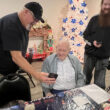Sean C. Morgan
A Lebanon city official told a Sweet Home group Thursday, Nov. 15, that communities can’t solve every part of homelessness and must focus on solving specific parts of it.
In Lebanon, the community has been focused on keeping people from becoming homeless in the first place.
Sweet Home Police Chief Jeff Lynn invited Lebanon Community Services Officer Dave Albanese to Sweet Home to talk to a small group of local officials and citizens about what Lebanon has done in the past couple of years to address homelessness, in what was a low-key informal conversation in Sweet Home.
In addition to Lynn, present at the meeting were Mayor Greg Mahler; councilors Susan Coleman, Diane Gerson, Dave Trask and Lisa Gourley; Sweet Home Community Services Officer Gina Riley; City Manager Ray Towry; Sweet Home School District homeless liaison Kristi Walker; Chamber of Commerce Interim President George Medellin, and residents Bob Dalton, Henry Wolthuis, Dick Knowles and Jim Corley.
“I know a lot of you in the room have been looking for options to help the homeless population out,” Lynn said. “We’re real similar communities.”
The chief said he has been watching what’s been happening in Lebanon for the past couple of years. “Every community faces this. To be honest, no community has it figured out.”
Lebanon has been taking an approach of “helping hands” rather than “enabling,” after a homeless summit in October 2016 with homeless activist Robert G. Marbut, he said, and he thought it might worthwhile to hear about Lebanon’s experiences.
Albanese, who was a pastor for 38 years, has been CSO in Lebanon for three years.
Police Chief Frank Stevenson made it “one of my top priorities to deal with homeless folks,” Albanese said, and they decided to hold the summit. “We knew we needed some expertise to come in and help us. We knew we didn’t understand the homeless.”
“Homeless” is a broad term with many causes, he said, and “we had to understand it,” while noting “they’ll always be with us.”
Lebanon had a lot of agencies helping the homeless, Albanese said, but they didn’t have a lot of conversation among them. Today, they work together in a homeless coalition. Albanese is the chairman.
That group “wanted to make sure homeless children or homeless families were a priority,” Albanese said. The coalition members wanted to provide resources to them before they became homeless. “We knew we couldn’t do everything.”
Teachers know a lot about their students before anyone else, Albanese said, so the district was a key resource in identifying those at risk for homelessness, and then-Supt. Rob Hess made sure it was a priority.
“The Boys and Girls Club was a great resource,” Albanese said. For children already living outdoors, in an RV or a car, “they had showers and food,” and the children were used to going there.
To help such kids be successful, it’s important for them to be able to shower and have clean clothes, he said.
Beyond those down on their luck are those who are homeless by choice, he said. Ask them, they’ll say, no, they don’t want to be homeless; but they don’t want to do what it takes to escape it. They’ll say no to work.
Once people have been homeless two or three years, it becomes difficult to move them into a home, Albanese said.
When homeless, they live a completely different lifestyle, with a completely different way of thinking, where things like blankets and clothing are disposable because procuring new blankets and clothing is easier than doing laundry. They also throw away food and leave messes around their tents, tossing trash out the front of it.
To be able to live in an apartment, they need to understand the basics of living in homes, a budget and what it means to be a good tenant, like throwing trash in the trash can, he said. It’s a big shift when someone has learned to live outdoors.
“You want them to get a job,” Albanese said. They have to show up, but a criminal background is common. Even if they have a job, they may have to spend time in court or a jail or may have warrants for failure to appear. Then they don’t show up to work.
With the difficulty in moving the homeless back into homes after a couple of years, “we want to prevent homelessness,” Albanese said. The homeless coalition wants to figure out where the tipping point is so it can use its limited resources to stop the at-risk from going over that point.
That doesn’t stop Albanese from going to bat for the homeless on the street, and he’s had some success.
He talks with prosecutors and judges to remove fines and other barriers to try to help them move forward, he said. Sometimes it works.
Albanese has had some success working with Lebanon’s homeless population, which is centered around Ralston Park on Park Street near the center of downtown. The location is close to a bus stop, restrooms, free food and illegal drugs.
“Every day that I’m on duty, I’m at Ralston Park,” Albanese said. One day, he knocked on the door of a vehicle containing a homeless man, who, Albanese knew, had a warrant. The man initially refused to come out because he didn’t want to go to jail.
He persuaded him, and the man went to jail for two weeks, Albanese said. He made sure to stop by the jail and check on him regularly to encourage him. The man was struggling with a drug addiction. He had a girlfriend and a child, and the Lebanon community got him some help. He was able to get a job and an apartment.
“It isn’t perfect,” Albanese said. “The couple is back in a car right now, but he thinks they’ll be OK. Dealing with the homeless is not a sprint. It’s a double marathon. There’s such a change in mindset for the homeless. We give them a game plan.”
After a couple of years, he said, “our homeless population is down dramatically.”
The biggest barrier at this point, Albanese said, is mental health issues. So many homeless have mental issues, and there’s little the community can do.
“We cannot get everybody,” Albanese said. Sometimes, the homeless don’t want the resources they need, and sometimes, the resources are not enough.
During the discussion, Wolthuis said he asked a number of local homeless people whether they would be willing to wash a window or do a small job in exchange for a voucher for a shower. The majority told him no.
“It’s an awful thing,” said Wolthuis, who was hoping to make a public shower available to the homeless. “I just don’t know where we go.”
Albanese suggested that the people gathered around the table talk.
“This is a great start, getting people together,” he said.
Medellin said that seven or eight churches want to focus on helping the homeless, and he’s willing to do his part.
“My hope is we’re just going to take some steps forward,” Lynn said. Lebanon has done a lot of the work already, and he would like to translate that to Sweet Home.
“You have to sincerely help those who want to be helped,” Albanese said. “What you’ll be doing is making a difference for another generation.”
Lynn said he would like the group to meet again in early December. No date has been set yet.




